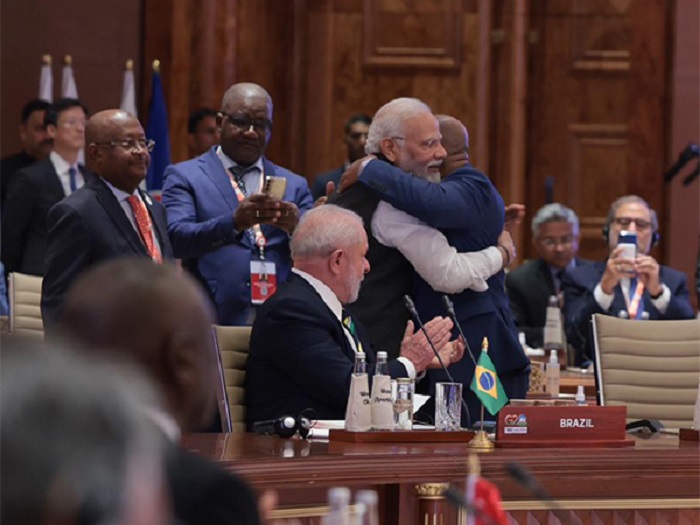
New Delhi: Soon after Prime Minister Narendra Modi announced on 9 September the acceptance of the permanent membership of the African Union (AU) into the G20, Azzali Assoumani, Chairperson of the AU became emotional and later admitted that he “was about to cry”.
India led in bringing recognition to the AU as part of its efforts to bring the “Global South” together. This effort has received a fillip with the admission of the AU into the 55-member G20.
While the successful issue of the joint communique at the end of the Delhi Summit goes to India’s credit, of far greater significance and strategic importance is India’s Presidency which steered the AU’s stepping into the G20. Implemented with the full support of all member countries, the decision has significant implications for the G20 and the Global South.
The credit for this development goes to India’s Prime Minister Narendra Modi, who in June this year, had written to G20 leaders to propose that the AU be given full membership at the upcoming Delhi G20 Summit.
With widespread global support for adding the AU to the G20, it became the second regional bloc to become a permanent member after the European Union (EU).India’s leadership of the global south has gained momentum and will in the long-term be a voice for greater good. The AU’s voice in this platform will thus add value.
The idea originated after the ‘Voice of the Global South’ summit in January 2023, in which most of the African continent’s 55 countries participated. Discussions were then carried forward in Addis Ababa, headquarters of the AU.
So far only South Africa from the entire African continent had been a G20 member. Many African leaders had argued that Europe was represented by five countries as well as the EU, and that the AU merited similar representation as well. Very soon, the US and French Presidents affirmed their support.
As one observer aptly notes, the move is a right step towards a “just, fair, more inclusive and representative global architecture and governance. ”India rightly focused its attention, as part of the G20 Presidency, on incorporating the priorities of the African countries in the G20 agenda.
The move is also a reflection of the intensity of New Delhi’s engagement with Africa. The first such initiative occurred when more than 40 Heads of State and Government came together for the India-Africa Forum Summit in October 2015.
Under the Africa Outreach initiative, India undertook Ministerial level visits to all African countries and PM Modi himself has visited at least ten countries in Africa in the last nine years. While India’s structured outreach to Africa began in 2008, China was already ahead, as it first held its outreach in 2000, when Jiang Zemin was President.
India’s efforts to get the AU into the G20 demonstrate that it does not intend to get involved in Africa for one-sided engagement . The purpose is to have cooperation at a much broader and mutually beneficial level, important to build trust and transparency.
By way of background, it may be mentioned that predecessor to the AU, the Organization of African Unity was established sixty years ago, on 25 May 1963.At that time, it symbolised African unity.
Today, the AU has repeatedly come under fire for failing to achieve that objective. The real question is whether the AU can speak for a resurgent Africa in one single voice at the G20. Senegalese President Macky Sall, a champion of the cause of the AU, aptly states that the move has been long overdue, given the continent’s economic and demographic weight.
He opines that African leaders can help devise a fairer and more inclusive global financial system and multilateral solutions to pressing challenges such as climate change and pandemics as a full G 20 member.
As a full member, the AU will weigh in on G20 commitments and prioritise its primary interests, such as debt restructuring, the reform of the international financial architecture, and climate funding. This will require African countries, to overcome their divisions. It may take a stronger AU Commission to harmonise African countries’ various positions.
At the end of the day, the inclusion of the AU in the G20 solidifies India’s status as a key player in global governance and as a nation that champions inclusivity and diversity on the international stage. It also shows the natural progression made by India in its partnership of the African continent, giving it more meaning and a strategic entry point to enhance ties in fields as diverse as trade, education, healthcare, and technology.
India’s endorsement of the AU comes at a time when New Delhi’s voice carries increasing weight within global community on account of its burgeoning economy and geopolitical influence.
The inclusion of the AU in G20 will therefore, give India diplomatic heft in Africa, which has in the last several decades become a place for geo-political rivalry amongst the major powers including the US, Russia, and China, all vying for political and economic influence in the resource-rich continent. India, on her part, plans to actively engage with Africa in matters of climate change mitigation, trade and technology and infrastructure development.
The latest development can be contextualised as part of India’s positioning to be the leader of the Global South. Geo-politically, the G20 Delhi Summit also represents an acceleration in the contest between China and other major powers for influence in the global south.
PM Modi has proved that he is today a more important figure in the global south and a heavyweight in the developing world. The Indian Prime Minister Modi offers an alternative vision of north-south relations, focused on enhancing the voice of developing countries in global governance while at the same time cooperating, rather than confronting the West.
Modi’s advocacy of G20 membership for the AU is thus a wise geo-political step that will make the forum even more inclusive.